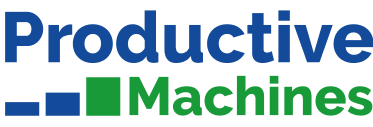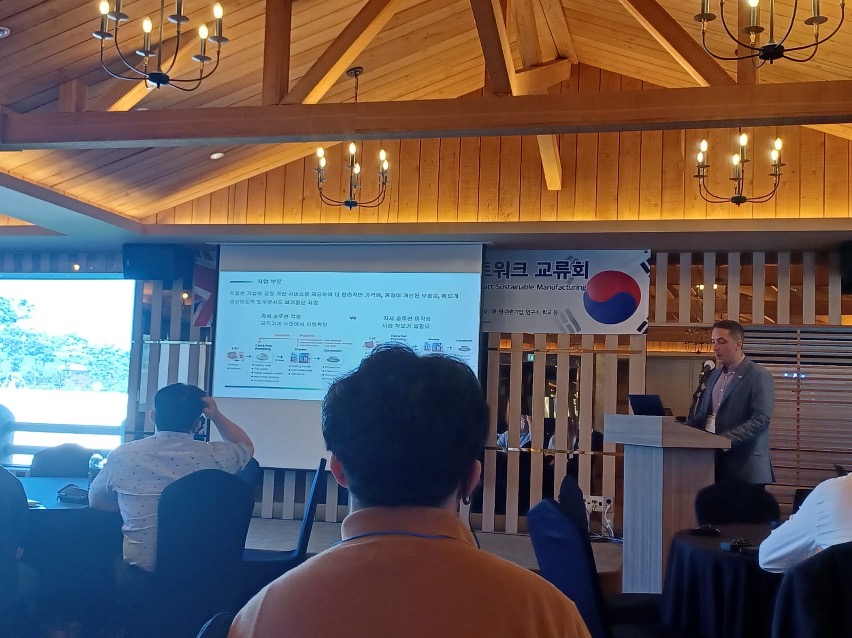Green Machining: How to save costs and manufacture a more sustainable future, one machine at a time
In this article we delve into the crucial role technology like that developed by Productive Machines can play in boosting sustainability and productivity in manufacturing.
By finally solving the old and frustrating problem of machine chatter, this technology could save a staggering 2.5 gigatonnes of carbon dioxide emissions by 2050. To put this into perspective, 2.5 gigatonnes is equivalent to the UK’s total CO2 emissions - every factory, fire, car, flight and light - for six years.
Computer Numerical Control (CNC) machining and sustainability
CNC machining has a crucial role to play in environmental sustainability. Every day across the globe, Computer Numerical Control machines turn energy and raw materials into the components of vehicles, computers and just about everything else we use every day.
There are around four million CNC milling machines globally, drawing down huge flows of energy. At that scale, improvements in efficiency can have a huge net effect. This is the promise offered by technology like that of Productive Machines.
Because of the huge scale of CNC machining, we can have a big effect fast.
Groundbreaking innovation like that from Productive Machines can therefore pave the way to a greener and much more sustainable manufacturing future.
Who are Productive Machines?
Productive Machines is on the leading edge of technology to optimise CNC machining. An artificial Intelligence (AI) startup from Sheffield in the UK, transforming how manufacturers manage milling machines.
The company was formed in 2021 as a spin-out from the University of Sheffield Advanced Manufacturing Research Centre (AMRC) developing a new way of analysing machines and configuring them to boost process quality, productivity and sustainability.
Productive Machines are a team of people on a mission to maximise productivity of machine tools. Using a unique digital twin to simulate millions of combinations of machine settings to arrive at the optimum feed rate and spindle speed setting for a given process prior to manufacturing. This eliminates chatter vibrations and provides machining optimisation, preventative maintenance and part quality that may not be achieved by a human operator even with years of continuous improvement. Productive Machines is doing that by using the most up-to-date methods (digital twins and AI) to solve one of the machining industry’s oldest problems - that of chatter.
Productive Machines is backed by major investors, including Boeing and the UK Innovation & Science Seed Fund, and is created to deliver a fully-automated Software-as-a-Service product that will be accessible to manufacturers of all sizes, anywhere in the world.
Why does CNC matter for sustainability?
In modern manufacturing, one technology stands as a cornerstone: CNC machining. CNC machining produces everything from aerospace parts to the casing of Mac computers to jewellery. And even where it does not directly produce the finished product, as in, say, the food industry, it is CNC machining that makes the machines that produce almost everything else.
CNC manufacturing has driven the advanced manufacturing processes that have redefined efficiency, accuracy, and cost-effectiveness.
Its level of precision has revolutionised industries ranging from aerospace to healthcare, enabling the creation of cutting-edge products that were once only imaginable. Its versatility empowers designers and engineers to explore new frontiers, unleashing unprecedented creativity in fields as diverse as custom prosthetic limbs to engine parts and chassis components. It is the tool that is building the 21st-century world.
CNC machining is a huge industry (estimated at $96bn in 2022). It is growing fast. Five-axis machine tools have brought radical improvements in capability and cycle times, and alternatives such as additive manufacturing are not fully commercially viable.
So optimising machining for efficiency and sustainability matters.
Why eliminating chatter matters in CNC machining?
However, a key problem blocks the path to truly efficient CNC machining. The issue of machine chatter has been a serious frustration in machining for many decades, but until now the only solution has been trial-and-error iteration, experiments to reach a set of machine settings that minimise these vibrations. As FW Taylor, wrote in 1907: “Chatter is the most obscure and delicate of all problems facing the machinist”.
In the realm of CNC machining, the issue of chatter poses significant challenges. Like an unruly guest at a finely orchestrated event, chatter disrupts the smooth flow of operations, demanding attention. It leads to slower cycle times and to increased waste.
Chatter - the vibrations arising from unstable interactions between the cutting tool and workpiece - leads to surface irregularities and dimensional inaccuracies. These jeopardise the quality of machined components, leading to increased rework, inefficiency, scrap, and compromised customer satisfaction.
Why does this matter? It matters because the environmental costs of chatter are significant. Left unfettered it can lead to:
-
Waste materials and parts Workpieces with
chatter damage are unusable, significantly increasing
waste. This scrapped metal was hugely energy intensive
to get to a usable state; now it is useless, thanks to
chatter.
Chatter also wears down tools faster, leading to increased costs and unnecessary waste. Frequent tool changes not only add to expenses but also consume valuable time that could be dedicated to productive machining. -
Hugely increased energy usage Machinists lose
much time as they experiment to get to a drill speed
that eliminates chatter. This experimentation time is
hugely costly in wasted energy drawn down.
Chatter means excess energy consumption, resulting in higher operating costs and increased carbon emissions.
So, as the global focus on environmental responsibility grows, manufacturers must take measures to minimise waste and energy usage associated with chatter. That means prioritising the optimization of machining parameters, tool selection, and machine rigidity. Changing parameters is easy to implement as it doesn't involve buying extra tools or buying a new machine tool. Chatter is a crucial problem that successful, sustainable manufacturers should be tackling head-on.
How does our technology work?
With our unique technology, customers get to the best part, faster, the first time.
Using artificial intelligence (AI) and digital twins of the milling process, we identify drill parameters that will be vibration-free, automatically personalising the process to eliminate chatter.
This dramatically cuts cycle times, which in turns dramatically cuts energy consumption and CO2 emissions.
It’s a little like producing noise-cancelling headphones for milling machines. As with advanced headphones, we model the situation electronically and put in place a solution that cuts out the noise or chatter we don’t want.
This enables us to bypass the iterative process of getting to chatter-free drill settings that holds up, and adds cost to, manufacturing. By eliminating chatter vibrations, machining companies get to the best part, faster, first time with reduced cost, energy usage and waste.
We do this by simulating millions of combinations of machine settings to find the optimum -- an optimum that humans would never reach, even with five years’ continuous improvement.
Using these mathematical models and simulations we see remarkable results. For example steel firm Ficep UK saw the efficiency of their process increase by 110 per cent, with cycle time cut by 53 per cent.
Unlocking potential: the workshop results of anti-chatter technology
In our work with global manufacturers such as Renault and MASA Aerospace, this technology has shown it can:
- Cut the machining design and set-up time by 20 per cent
- Cut cycle times by ten to 53 per cent
- Cut operational and maintenance costs by 25 per cent
- Reduce cutting tools costs by 11 per cent
- Reduce cutting noise by five times
So, the technology offers a huge increase in productivity, massive reductions in cost and a very significant sustainability impact.
Key benefits for manufacturers
- Accelerated time-to-first-part: achieve faster production cycles, reducing lead times to deliver the first part swiftly.
- Lower production costs for the first part - attain the bulk quantity price faster.
- Cut energy costs by up to 25 per cent.
- A stand alone solution. Rely on our technology to analyse for optimal results without the need for PhD-level experts of your own.
- We can optimise milling machining processes in minutes instead of weeks, at a fifth of the cost and without expert engineers.
- Proven technology: it is already deployed at ten major manufacturers, including Renault and MASA Aerospace
6 Reasons to Eliminate Chatter in CNC Machining for Sustainability
Waste Reduction: Chatter elimination optimizes the cutting process, reducing material waste and supporting sustainable manufacturing practices.
Resource Efficiency: The longer cutting-tool life achieved through chatter reduction means less need for frequent tool changes.
Energy Conservation: Reduced vibrations lead to lower electricity consumption during machining.
Enhanced Product Quality: Chatter elimination results in improved product precision, reducing defective parts.
Extended Equipment Lifespan: Smoother machining operations reduce machine wear, prolonging the life of CNC equipment.
Safer Work Environment: Reduced cutting noise improves workplace safety and contributes to a healthier workplace.
An exciting future: our backers and partners
We are far from alone in seeing the potential of this anti-chatter capability.
There is a massive opportunity associated with taking this capability into every workshop in the UK and beyond. There are four million machines worldwide which would benefit from the company’s care, and which could be producing the same goods in up to half the time, with 25 per cent less energy drawn down.
Our first first investor was Boeing HorizonX Ventures, the venture capital arm of the world's largest aerospace company.
In 2023, a £2.2 million seed round attracted investment from UK Innovation & Science Seed Fund, Northern Powerhouse Investment Fund, Mercia Asset Management, ACT Venture Partners, Fuel Ventures and Innovate UK.
The Investment Director for UKI2S and Future Planet Capital Group, Alexander Leigh, hailed the technology's potential to reduce energy consumption by up to 25 per cent.
Dr Erdem Ozturk, CEO of Productive Machines, highlighted the accessibility of their cutting-edge AI technology to manufacturers of all sizes worldwide.
With these funds, Productive Machines is set to expand its team and deliver AI technology as an automated Software-as-a-Service (SaaS) product.
The firm’s network of partners is growing fast. It already includes:
- Adamos - the marketplace for industrial apps
- Kistler - the machine metrics specialists
- Seco - one of the world's largest providers of metal-cutting solutions
Sheffield AMRC: Nurturing Productive Machines
The AMRC is a beacon of innovation in the manufacturing industry, consistently driving advancements and fostering promising startups.
Productive Machines grew out of a six-year research project on machining dynamics at the centre. In 2021, under the leadership of CEO Dr Erdem Ozturk, Productive Machines was founded to take the results of this groundbreaking into every machining workshop.
With access to cutting-edge research, state-of-the-art facilities, and a pool of internationally significant expertise in machining at the AMRC, Productive Machines rapidly transformed from a research project into a highly promising startup.
The research team developed digital twins for the machining processes that had unique selling points compared to commercially available products. With the support of the AMRC Dr Ozturk was able to go beyond reports and publications to form a successful startup with industrial impact.
Greener machines: Our mission and vision
By democratising cutting edge technology and offering it as a straightforward SaaS product, we’re creating a future where every manufacturer and machine operator can elevate quality, productivity, and sustainability.
We want to make cutting optimization technology accessible to all, regardless of the scale of operation or expertise.
Productive Machines' vision extends beyond mere technological advancement; it's about empowering manufacturers and machine operators to excel, to save costs - and to help save our planet.





